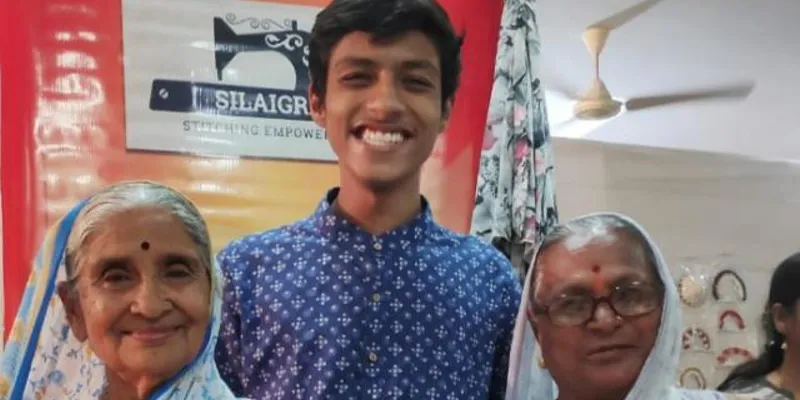Meet the changemaker whose startup is working to make women in rural Maharashtra self-reliant
Wasudev Mishra, the young founder of Silaigram, is enabling rural women to be independent and earn their livelihood by upcycling cloth waste.
Wasudev Mishra (20) comes from a village in Vidarbha, Maharashtra, where he grew up witnessing first hand the consequences of poverty and unemployment. His family, on many occasions, could not afford school supplies. It was even more troubling when girls from his community were being forced to quit school because their families couldn't afford it. His family had to shift his sister to a low-budget school to ensure Wasudev could continue his education in an English-medium school.

Wasudev with the women working at Silaigram.
Thanks to his dedication and entrepreneurial abilities during his time at St John High School, in Pulgaon, Maharashtra, Wasudev got the opportunity to be part of an exchange programme in the United States, where he was strongly encouraged to be independent and self-reliant. Upon his return, he volunteered with different social projects, mentored young people, and discovered that he had a passion to help women of his village become self-reliant.
Founded in 2018 by then 19-year-old Wasudev, Silaigram, a social impact startup, aims to provide sustainable livelihoods in the rural parts of India. He recognised the lack of support and resources offered to young women and girls, and started working towards creating a new space in the system to empower them with opportunities.
Enabling change among rural women
Everyday one million metric tonnes of cloth waste is produced in India’s mills and a lot of it ends up in landfills and in the oceans. Using upcycled cloth waste coming from garment factories and decor shops, Silaigram provides jobs to marginalised women who can stitch the material into jholas and kurtis. As part of the startup, Wasudev has also set up a one-of-a-kind design lab that provides women with the material and freedom to design new and innovative products.
One of the women in the village, who now manages the centre, made a wrist band from scrap cloth since she couldn’t afford to buy one. This creativity is something Wasudev found in all the women, and he created the design lab to nurture it. The design lab is unique, especially because the fabric design industry in India and other parts of the world is dominated by men.

A woman engaged in upcyling cloth into jholas and kurtis.
One of the products from Silaigram’s design lab is the ‘Jhola of Love’. Most of the times while shopping, we end up buying single-use plastic or paper bags. To tackle the same, the Silaigram women developed a cloth bag known as ‘Jhola of Love', which can be folded into a pocket-size pouch shaped like a heart. This, in turn, can be carried around in a wallet or a handbag, eliminating the use of plastic bags every time a store is visited.
In the last one year, Wasudev has worked with a team, which includes his mother, sister, and friends, to upcycle over 1,000 kilograms of cloth material (including synthetic cloth), preventing it from entering the ocean's ecosystem. In recognition of his ability to empathise and create positive change, in July 2019 he was elected as an Ashoka Young Changemaker, one of the largest networks of social entrepreneurs and changemakers.
With his experience in the startup ecosystem of Nagpur, Wasudev intends to create a hyper-local network of changemakers who can support youth in launching their own initiatives. While there are several local networks like Rotary and Young Presidents Organisation that promote services to society and entrepreneurship, Wasudev feels the Changemaker Network would act as a bridge between these worlds, helping young people accelerate their journey towards becoming business and social changemakers.
(Edited by Suman Singh)








